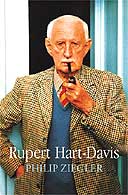
Rupert Hart-Davis: Man of Letters
by Philip Ziegler
Chatto & Windus £20, pp356
Rupert Hart-Davis's position at the centre of English literary life in the 20th century is indisputable. Whether or not he stands on his own enough to justify a biography, however, is disputable.
His edition (the first) of The Letters of Oscar Wilde monumentally changed for the better both Wilde's reputation and Wildean scholarship. His work as executor and torchbearer for a whole pride of writers, including Sassoon and Ransome, was exemplary and selfless. He was a generous committee man, especially in his work with TS Eliot to secure the future of the London Library. As a quality publisher he was resistant to rampant commercialism, though among productions such as the great Leon Edel Henry James the occasional Unusual Vegetables did slip through under the Hart-Davis imprint. He was, as Philip Ziegler's title says, a 'man of letters'.
With the exception of a short and undistinguished stint on the stage, it was always clear that a 'man of letters' was what he would be. For someone whose life centred on that necessarily sedentary world, however, his private life as detailed here was fairly eventful. The first of his four marriages was to Peggy Ashcroft, a biographical detail cranked up a gear by the fact that in order to marry her, Hart-Davis dumped Celia Johnson.
But time is cruel to figures like Hart-Davis. When a biographical subject has as many unappealing character traits as Hart-Davis, the normal route is to highlight the quality of their work. But for Hart-Davis, aside from his superlative editing, his work is far from watertight. His longest printed work underlines this.
Hart-Davis's correspondence with his old English teacher from Eton was published in six volumes as The Lyttelton Hart-Davis Letters, edited by Hart-Davis himself. Each volume received acclaim from a certain type of reviewer writing in a particular, coy vein: 'witty', 'urbane' and 'civilised'. All this proved too much of a temptation not to send up and, almost immediately, in 1984 Craig Brown responded with his masterpiece of satire, The Marsh Marlowe Letters.
Ziegler, understandably, does not refer to Brown's work. Rarely has a thinnish reputation been more wholly exploded. The Hart-Davis figure is caught attempting to write the authorised biography of Melvyn Bragg ('arguably almost as good as any other young Cumbrian writer of his generation'), reminiscing about 'E Morgan F's' table manners and Virginia Woolf's shoe-size, while the Lyttelton character, in response to a query from his former pupil about which hobbies to enter into Who's Who, gets to suggest 'rooting out the second-rate (and publishing it)'.
Hart-Davis published and admired a lot of second-rate literature, but was a friend, supporter and publisher of a number of first-raters too. If Hugh Walpole does not stand up, and Blunden and Plomer seem unlikely to achieve more justified revivals, then for Wilde and Sassoon at least, Hart-Davis should be thanked. Ziegler's thorough book contains all the trademark brilliance and wisdom for which his readers admire him, but it is impossible not to feel that he should return to writing about greater men than he does here.

